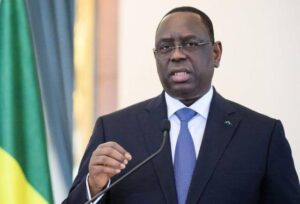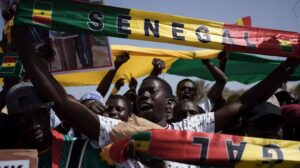In a move stirring both national and international concern, Senegal has clamped down on mobile internet access as citizens express discontent over President Macky Sall’s decision to delay the presidential election scheduled for February 25. The postponement comes amidst an electoral dispute, with opposition leaders and their supporters taking to the streets in protest.
The Ministry of Communication, Telecommunications, and Digital Economy officially declared the internet shutdown, citing the dissemination of “hateful and subversive messages” on social media that posed threats to public order. This move raises questions about the freedom of expression and information access during a crucial time in the country’s political landscape.

The decision to delay Senegal’s presidential election, a historic move in the nation’s political landscape, has triggered widespread protests. Opposition leaders condemned the postponement as a “constitutional coup,” setting the stage for potential further demonstrations. The political tensions in Senegal have been escalating for over a year, marked by fatal clashes among opposition supporters and the disqualification of two opposition leaders.
 Also, read; Timbuktu’s Manuscripts: Unraveling the Ancient Treasures of West Africa
Also, read; Timbuktu’s Manuscripts: Unraveling the Ancient Treasures of West Africa
The cost of internet shutdowns in Senegal has not gone unnoticed. Last June, the country experienced disruptions in mobile internet access, resulting in a loss of $57.5 million. This blackout, spanning 3,946 hours, impacted approximately 8.01 million people. Senegal ranked ninth globally for incurring one of the most expensive internet shutdowns.
Analysts express concern over the potential for heightened instability in West Africa due to the crisis in Senegal. The region has already been grappling with an increase in coups and threats to democratic institutions. The recurring use of internet shutdowns as a means of controlling information flow during political unrest adds to the broader conversation about digital rights and the role of technology in shaping democratic processes.
 The issue of internet shutdowns is not unique to Senegal. In 2023, Sub-Saharan Africa faced a significant financial setback of $1.74 billion during 30,785 hours of internet downtime, affecting 84.8 million people. Major internet shutdowns on the continent have been associated with military coups and protests, highlighting the broader challenges in balancing political stability with the fundamental rights of citizens.
The issue of internet shutdowns is not unique to Senegal. In 2023, Sub-Saharan Africa faced a significant financial setback of $1.74 billion during 30,785 hours of internet downtime, affecting 84.8 million people. Major internet shutdowns on the continent have been associated with military coups and protests, highlighting the broader challenges in balancing political stability with the fundamental rights of citizens.
